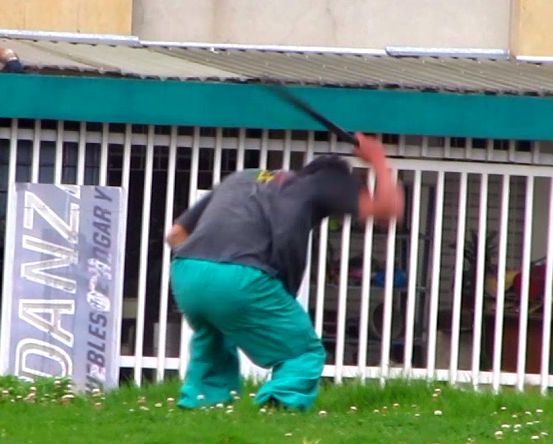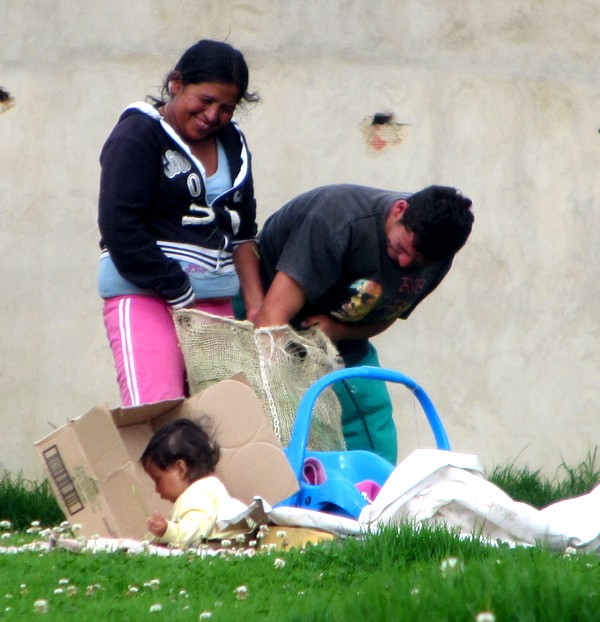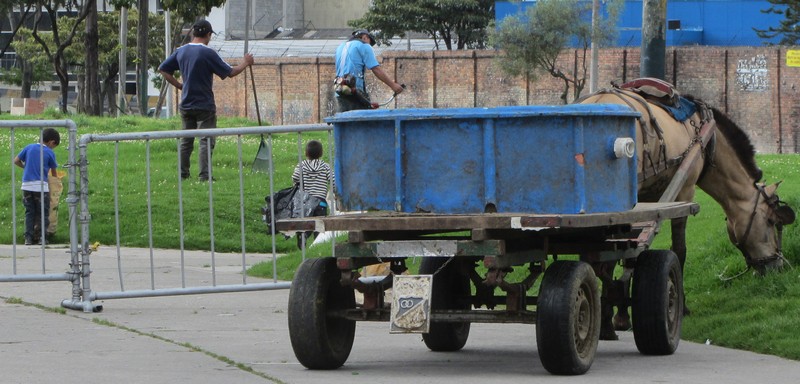Cutting the Lawn on a Saturday Afternoon
 Saturday afternoon. I'm parked by the Coliseo and the Campin sports stadium,
where the staff are friendly and welcoming. Water is available and there are
showers I can use. In the middle of this bustling city of 10 million, there is
a patch of green grass.
Saturday afternoon. I'm parked by the Coliseo and the Campin sports stadium,
where the staff are friendly and welcoming. Water is available and there are
showers I can use. In the middle of this bustling city of 10 million, there is
a patch of green grass.
A young man in the middle of the lawn appears to be beating something, or someone, mercilessly. My curiosity is piqued. Looking closer, I discover that he is actually cutting grass with a machete and scraping it into piles.
At first, I think that this is his job. That he is the lawnmower, hired by the city to cut the grass. His wife and baby relax in the grass nearby.

From time to time, she helps him to bundle the grass cuttings into bags and boxes.
It is then that I realize what is going on. They carry the bags and drop them into the cart standing nearby. In this modern city you can see luxury SUVs passing horses and carts in the middle of downtown.
So the grass around the stadium is a source of (free?) hay for this young couple, fairly low on the economic ladder. But nowhere near the bottom, as they have a horse and cart and are not living in the sewers - see the video below.
The stadium gets their grass cut. A fair exchange.
Later, a family arrives in a cart. Even as they came down the road, I admired their horse, as it was clearly a finer breed. It held its head high as it pulled them along the road.
They tied the horse to a light standard, allowing it to graze in the grass. The whole family ran into the lawn with bags to fill. Father pulled out a gas powered weed wacker and began to cut a wide swath of grass as the children ran after him gathering it into their bags.

For a while, the young couple looked on with eyes of envy. And then, they returned to their tasks. I can't imagine swinging the machete like that for more than a few minutes, but the young man continued for hours. I guess he is in good shape.
From where I sit, I see a whole economy near the bottom of the ladder. An area of the parking lot is a local dump. People discard their recyclable trash by the road in the evening. During the night, a hoard of scavengers descends and sorts out what they want or can sell. In the morning, a truck collects what is left and the area is once again spotless. The cycle continues daily.
A common sight in the city are carts full of recyclable materials being collected by men who specialize in cardboard or plastic or other rags and bones, as they used to be called. Most pull their carts by hand. The well-off ones have horses. Interestingly, there is no equivalent of the motor on a wheel, that is common in China and South-East Asia, and can be used as a mechanical horse in diverse ways.
Lest you get the wrong impression. I spent Tuesday morning in one of the many fashionable shopping districts of Bogota. Block after block are lined with upmarket stores selling fashionable clothing, elegant design, and expensive gadgets at international prices.
